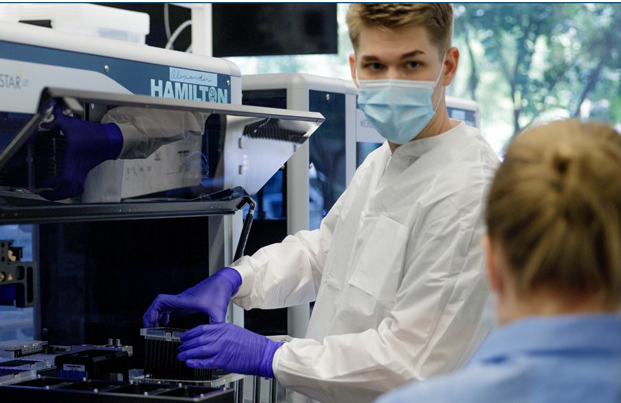Erica Gralla, Associate Professor of Engineering Management and Systems Engineering, led a study on speeding up COVID-19 testing processes during the height of the pandemic in 2020-2021. Her team worked with a large University of Maryland testing center serving the State of Maryland and identified process changes that could nearly double their capacity with minimal investment of resources. Key to this effort was a focus on the laboratory operations and processes.
Despite clear operational challenges such as supply availability and personnel shortages, there have been very few attempts to examine these processes systematically.
Supported by a rapid response grant, the team developed a discrete event simulation model to represent the complex process steps involved in PCR testing, then used the model to identify bottlenecks, explore resilience to surges in demand, and evaluate potential changes to improve the process. One key insight was a significant bottleneck in the time-consuming “de-swabbing” step. A simple process change could alleviate this bottleneck: a virucidal sample collection medium to enable safe discarding of swabs at the point of collection. With this change, the capacity of the laboratory nearly doubled.
Supported by a rapid response grant, the team developed a discrete event simulation model to represent the complex process steps involved in PCR testing, then used the model to identify bottlenecks, explore resilience to surges in demand, and evaluate potential changes to improve the process. One key insight was a significant bottleneck in the time-consuming “de-swabbing” step. A simple process change could alleviate this bottleneck: a virucidal sample collection medium to enable safe discarding of swabs at the point of collection. With this change, the capacity of the laboratory nearly doubled.
This research was critical because testing capacity fell far short of the need in Maryland, and throughout the United States and the world. Prompt testing was especially critical to mitigating the COVID-19 pandemic before vaccines were available, since it allowed cases to be identified and isolated before the disease could spread further. Long wait times for results were common, and many people were simply unable to access tests. This research project not only helped to improve capacity in one laboratory but also emphasized the importance and potential impact of examining operational processes in COVID-19 testing laboratories – unfamiliar territory to many public health and laboratory experts.
Key to enabling these insights was an interdisciplinary research team, including University of Maryland professors Jacques Ravel from the Department of Microbiology and Immunology and Patti Gravitt from the Department of Epidemiology and Public Health, Polytechnique Montreal professor Nadia Lahrichi from the Department of Mathematics and Industrial Engineering, and Gralla and student Jad El Hage from GW’s Department of Engineering Management and Systems Engineering. The team has since expanded on this work to study COVID-19 testing processes elsewhere in the United States and across the globe.



